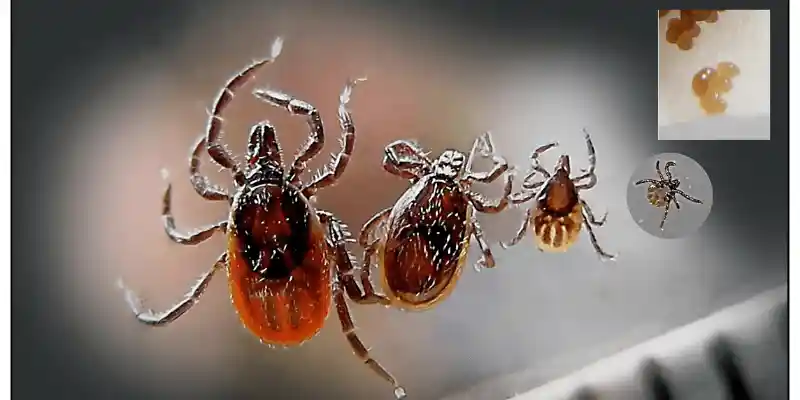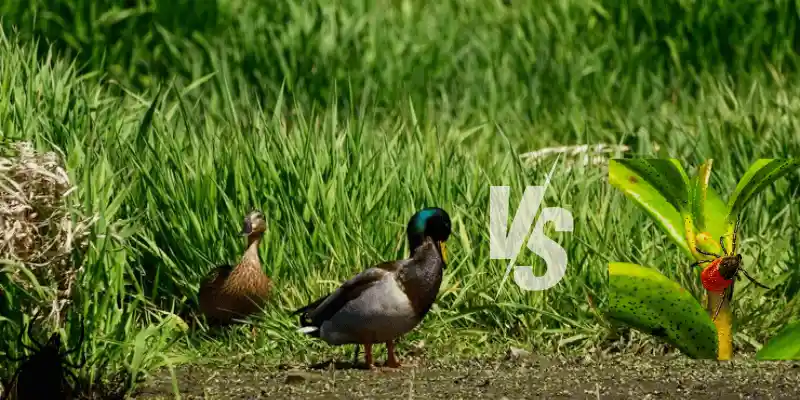When pondering do ducks eat ticks, it’s akin to discovering a hidden gem for those of us grappling with these tiny arachnids in our backyards. Yes, ducks do indeed consume ticks, amongst other bugs, making them invaluable allies in the quest to control tick populations.
This natural method of pest control is a sigh of relief for pet owners, outdoor enthusiasts, and farmers who routinely deal with the nuisance of ticks. These creatures are not just a bother; they’re carriers of dangerous diseases that can spread to both humans and animals with a simple bite.
In my own garden, introducing ducks was a game-changer. Unlike their counterparts like guineas, chickens, and turkeys which also help in pest control, ducks have shown a remarkable ability to find and feed on ticks, offering a layer of protection by reducing the risk of tick-borne diseases.
This method is not only effective but also adds charm to your garden with the presence of these fine feathered friends. So, to answer the question, “Can ducks eat ticks?” Absolutely, and they do so with great efficiency, making them a favored choice for those looking to safeguard their outdoor spaces from ticks.
Do Ducks Eat Ticks?
In this feather-ruffling article, we dive into the world of ducks and their dining habits, specifically uncovering the truth about their insatiable appetite for those pesky bloodsuckers we all despise: ticks.
Quack yes, ducks don’t just eat ticks; they are nature’s tick-fighting superheroes. This beak-tastic adventure into the flock’s life around the pond reveals more than just a simple way to get rid of ticks; it showcases the joy and benefits of raising ducks.
Feeding on insects is not just a control mechanism for the tick problem but also a way of providing a rich source of protein and minerals for the birds themselves.

Farmers and pet owners swear by the effectiveness of using ducks to control tick populations in their backyard. Beyond the charm and joy they bring, ducks offer a practical solution for keeping our outdoor spaces safer.
By stocking your pond with these feathered marvels, you’re not just raising ducks; you’re working with nature to rid your environment of ticks most naturally and beneficially possible.
Whether it’s for the health of your backyard ecosystem or the simple pleasure of watching these creatures quack and frolic, incorporating ducks into your tick-fighting strategy is a win-win situation.
Nutritional Value of Ticks for Ducks:
Ticks serve as a rich source of protein and essential amino acids, making them one of the perfect food sources for ducks.
These food items boast high levels of fat for energy and are low in carbohydrates, which is why they are a choice nutrition source for birds that require a diet high in proteins and fats.
Nutritional Content of Ticks:
The nutritional content of ticks includes a variety of nutrients that are ideal for ducks, such as high levels of vitamins, notably vitamin B12 and iron, which support growth, development, blood count, and migration.
The presence of amino acids like lysine and methionine aids in muscle growth, repair, and feather formation, maintaining the body temperature of ducks.
How Ducks Digest Ticks:
The digestive system of ducks is well-adapted to handle tough food items like insects and ticks. Their muscular walls in the gizzard effectively crush hard substances and exoskeletons into smaller pieces to be digested in the intestines.
Where digestive enzymes break down proteins and fats into molecules that are absorbed by the cells of the gut wall.
The Role of Ticks In A Duck’s Diet:
A tick-rich diet provides necessary nutrients for ducks, supplementing their diets with essential proteins and fats. This is particularly important for growing birds and during migration periods.
Wild birds consume various types of foods depending on their availability across seasons, making ticks an important source for their health, fitness, and survival in the wild.
The Benefits of Using Ducks for Tick Control:
Utilizing ducks as natural predators to manage tick populations offers numerous benefits over traditional methods like pesticides or insecticides.
Ducks do not harm wildlife or the environment with chemicals, making them a more cost-effective and eco-friendly solution.
They help eliminate pests that might develop immunity to chemical treatments, including predator birds, insects, and larvae, while foraging through vegetation and water, thus providing effective pest management solutions and protecting our ecosystems.
| What Are The Dangers of Ticks? |
|---|
|
Ticks are dangerous to some extent some of the main problems are as follows: Ticks Can Cause Lyme Disease:Lyme disease, spread by ticks, particularly deer ticks, in the midwest and northern parts of the country, presents symptoms such as fever, headache, rashes, sore joints, and muscles. Not all cases are severe, but without expert help, it can progress to short-term memory loss and excruciating pain for affected birds. Ticks Also Cause Colorado Tick Fever:Colorado tick fever, a tick borne disease prevalent in Colorado and high altitude areas in other states, causes fever, aches, and fatigue. Though less feared than Lyme disease, it can inflict serious pains on both humans and birds. Ticks Can Cause Rocky Mountain Spotted Fever:Rocky Mountain Spotted Fever is another tick borne disease, notably in the Rocky Mountain region. Symptoms include fever, vomiting, and rashes, and it can be lethal if untreated. Despite being associated with specific regions, such diseases also affect the midwest and northeast, underscoring the role of ducks in tick control within these areas. |
Other Behavior of Duck:
Can Ducks Sit on Unfertilized Eggs?
Can Ducks Move Their Eggs?
Do Ducks Have Ears?
Can Domesticated Ducks Fly?
Keeping Ducks Ponds Clean?
Do Ducks Eat Deer Ticks?
Indeed, ducks are known consumers of deer ticks, including black legged ticks across various regions of North America. These ticks, known scientifically as Ixodes scapularis, are notorious vectors for diseases such as Lyme disease, babesiosis, anaplasmosis, and Powassan virus.
Research conducted by the University of California has highlighted Indian Runner ducks’ particular fondness for western black legged ticks, underscoring the role ducks can play in managing tick populations.
Do Wild Ducks Eat Ticks?
Wild ducks are natural tick eaters, with species like Mallards, Black Ducks, Wood Ducks, and others, actively foraging in watery areas such as marshes, streams, ponds, and flooded fields.
As they move through vegetation searching for a blood meal, they encounter and consume adult ticks and nymphs hiding in grass, plants, and brush, making them effective agents of natural tick control through their digestive systems.

Do Domestic Ducks Eat Ticks?
Domestic ducks, including breeds like Calls, Mallards, Runners, Pekins, and Indian Runner ducks, are adept at tick consumption, especially in grassy areas of one’s backyard.
These breeds not only serve as efficient tick control agents but also provide companionship. Allowing them to roam freely during peak daily tick activity maximizes their tick-eating efficiency, proving beneficial for backyard poultry owners.
Do Baby Ducks Eat Ticks?
From the moment ducklings begin foraging, they start consuming insects and invertebrates, including ticks found in vegetation. Despite the lack of scientific data specifically on ducklings eating ticks, their natural tick-eating instincts suggest they would engage in this behavior if given the opportunity.
However, caution is advised before introducing hatchling ducks into tick-infested areas, as they are more vulnerable to predation. As they grow and their adult plumage develops, their survival instincts and capacity for tick control improve.
What Kinds of Ticks Do Ducks Eat?
Ducks are not picky when it comes to their diet and will consume various tick species found in their natural habitat. Among the ticks, deer ticks are particularly targeted due to their prevalence and the risk they pose.
Lone Star Ticks:
Lone star ticks, also known as turkey ticks, thrive in woodlands and grassy areas of the southeastern and eastern states, carrying various diseases. Ducks feeding in these habitats help control their population.
American Dog Ticks:
American dog ticks are found nationwide, preferring grassy and brushy areas. They are vectors for Rocky Mountain spotted fever and tularemia, making their control crucial.
Brown Dog Ticks:
Brown dog ticks prefer dogs but are ubiquitous as hitchhikers on their hosts, spreading tick paralysis and other diseases. Ducks can help manage these ticks in environments where canine hosts are present.
Groundhog Ticks:
Groundhog ticks reside in burrows with groundhogs but will also bite humans. They are known vectors for Tularemia and tick paralysis, presenting risks that ducks can help mitigate.
Woodchuck Ticks:
Similarly, Woodchuck ticks inhabit burrows and pose a risk to humans by spreading Tularemia. Ducks contribute to controlling these tick populations through their foraging.
Rabbit Ticks:
Rabbit ticks feed on rabbits and hares but may also bite humans, transmitting Tularemia. Ducks’ diverse diet includes these ticks, aiding in their control.
Squirrel Ticks:
Squirrel ticks, residing on squirrels, occasionally bite humans. Ducks play a role in managing these ticks in areas where squirrels are common.
Pacific Coast Ticks:
On the West Coast, Pacific Coast ticks feed on small mammals and rodents, capable of transmitting anaplasmosis and Colorado tick fever. Ducks in these regions help in reducing their numbers.
Conclusion:
Ducks serve as natural and effective allies in controlling tick populations across various habitats. By consuming a wide range of tick species, including those that pose significant health risks to humans and animals, ducks contribute to the ecological management of ticks.

